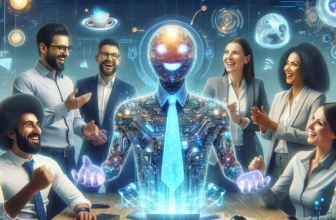Unlocking Success: Innovative Motivation Strategies for Millennials in the Workplace
Introduction
As millennials become the largest workforce demographic globally, understanding their unique motivations in the workplace is essential for organizations that seek to unlock their potential. This article explores the innovative motivation strategies tailored for millennials, emphasizing the importance of workplace culture, flexibility, recognition, professional development, creativity, and interpersonal relationships. Furthermore, we will provide real-life examples and actionable tools to enhance workplace motivation among millennials.
Section 1: Understanding Millennials' Workplace Motivations
The Millennial Mindset
The millennial generation, defined as those born between 1981 and 1996, possesses distinct characteristics that shape their attitudes towards work. They value purpose, social responsibility, and collaborative work environments. Understanding this mindset is crucial for businesses looking to implement effective motivation strategies. According to a Gallup report, millennials seek a sense of community and belonging at work, which enhances their motivation and engagement.
Key Motivational Factors
Several key factors contribute to the motivation of millennials in the workplace, including:
- Autonomy: Millennials prefer working independently and being trusted to make decisions.
- Purpose: They seek jobs that align with their values and contribute to the greater good.
- Growth Opportunities: Continuous learning and development are critical for their satisfaction.
- Feedback and Recognition: Regular acknowledgment of their contributions significantly enhances their motivation.
Section 2: Importance of Workplace Culture
Defining Workplace Culture
Workplace culture encompasses the beliefs, behaviors, and values that shape how work is done within an organization. A positive culture promotes employee well-being and drives organizational success. According to a Harvard Business Review article, companies with strong cultures see a significant increase in performance metrics.
How Culture Influences Motivation
A thriving workplace culture enhances motivation by creating an environment where individuals feel valued and empowered. It encourages collaboration, innovation, and open communication, all of which stimulate engagement. Organizations should aim to cultivate a culture that embraces diversity, inclusivity, and employee well-being.
Section 3: Flexibility and Work-Life Balance
The Rise of Remote Work
Remote work has become increasingly popular, particularly since the COVID-19 pandemic. Many millennials prefer remote or hybrid work arrangements, which provide flexibility for personal commitments. A PwC survey found that 56% of employees would choose to work remotely at least some of the time, highlighting a shift in workplace dynamics.
Balancing Act: Flexibility vs. Productivity
While flexibility is essential, organizations must ensure that it does not compromise productivity. Implementing clear expectations regarding performance and deliverables fosters an environment where productivity and work-life balance co-exist harmoniously.
Section 4: Recognition and Feedback Mechanisms
Types of Recognition
Recognition can take many forms, including verbal acknowledgment, awards, or monetary bonuses. Regular recognition not only boosts morale but also reinforces desired behaviors. According to a Forbes article, organizations that recognize their employees have higher engagement levels and lower turnover rates.
Implementing Effective Feedback Loops
An effective feedback loop consists of regular check-ins, performance reviews, and constructive criticism. Employers should aim to provide feedback in a manner that fosters professional growth and development, focusing on strengths while addressing areas for improvement.
Section 5: Professional Development Opportunities
Training Programs and Workshops
Millennials prioritize personal and professional development, making training programs essential for motivating them. Companies should invest in upskilling initiatives that allow employees to expand their skill sets and knowledge through workshops, online courses, and certifications.
Career Advancement Initiatives
Providing clear career progression paths enhances motivation among millennials. Organizations should offer mentorship programs, cross-departmental training, and leadership opportunities that empower employees to advance in their careers.
Section 6: Innovation and Creativity in Task Assignment
Encouraging Creative Problem Solving
Creativity is a pivotal attribute millennials bring to the workplace. Employers should assign tasks that challenge conventional thinking and encourage innovative approaches to problem-solving. This not only fosters motivation but also leads to groundbreaking solutions within the organization.
Projects That Foster Innovation
Companies can initiate programs that allow employees to work on passion projects or contribute to innovative solutions beyond their typical job roles. Hackathons or idea hack sessions are excellent ways to stimulate creativity and collaboration.
Section 7: Building Strong Interpersonal Relationships
Team Dynamics and Collaboration
Strong team dynamics are essential for fostering collaboration and enhancing motivation. Companies should encourage team-building activities and create an environment where open communication and respect are prioritized, leading to stronger relationships among coworkers.
Mentorship and Peer Support
Mentorship plays a crucial role in millennials' professional lives. Pairing experienced employees with millennials can provide guidance, support, and motivation. Peer networks also serve as platforms for sharing knowledge and experiences, enriching the workplace environment.
Section 8: Real-Life Examples and Case Studies
Case Study 1: Company X
Company X implemented a flexible work policy that allowed employees to choose their working hours and locations. As a result, employee engagement and satisfaction scores increased by 35% over a year. This transformation illustrated how flexibility and trust could unlock greater motivation among millennials.
Case Study 2: Company Y
Company Y focused on creating a strong workplace culture centered around recognition and feedback. By implementing regular feedback sessions and an employee of the month program, they experienced a 50% decrease in employee turnover, showcasing the power of recognition in motivating millennials.
Q&A Section
Q1: What motivates millennials in the workplace?
A1: Millennials are motivated by factors such as autonomy, purpose, growth opportunities, and recognition.
Q2: How can companies improve workplace culture for millennials?
A2: Companies can enhance workplace culture by fostering inclusivity, open communication, and employee well-being.
Q3: What role does flexibility play in motivating millennials?
A3: Flexibility allows millennials to balance personal and professional commitments, leading to higher motivation and productivity.
FAQ Section
Q1: How can recognition strategies motivate millennials?
A1: Regular recognition boosts morale and reinforces positive behaviors, making employees feel valued and engaged.
Q2: What types of training programs work best for millennials?
A2: Interactive workshops, online courses, and mentorship programs cater to millennials’ learning preferences and enhance their skills.
Q3: Are millennials more inclined towards remote work?
A3: Yes, many millennials prefer remote or hybrid work models that provide flexibility and better work-life balance.
Resources
| Source | Description | Link |
|---|---|---|
| Gallup | Employee Engagement Reports | Visit Source |
| Harvard Business Review | Why Good Culture is Good for Business | Visit Source |
| PwC | Survey on Employee Preferences for Remote Work | Visit Source |
| Forbes | Why You Should Focus on Employee Recognition | Visit Source |
| Forbes | Benefits of Employee Recognition | Visit Source |
Conclusion
Unlocking the potential of millennials in the workplace requires a multifaceted approach to motivation. Organizations must focus on innovative strategies that promote workplace culture, flexibility, recognition, professional development, and innovation. By doing so, they can enhance employee satisfaction and engagement, leading to a more productive workforce capable of driving the organization’s success into the future.
Disclaimer
This article was created with assistance from artificial intelligence (AI) to enhance research and drafting efficiency. All content has been reviewed and refined by human contributors.










